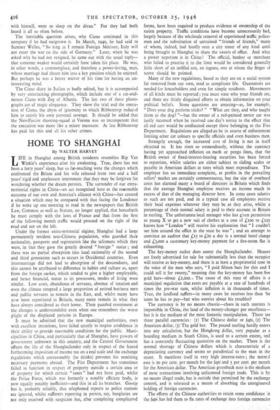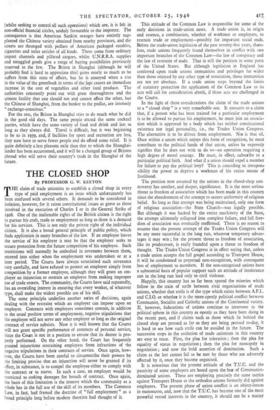HOME TO SHANGHAI
By WALTER HARVEY
LIFE in Shanghai among British residents resembles Rip Van Winkle's experience after his awakening. True, there has not been a forty years' sleep, but so far-reaching were the changes which confronted the Briton and his wife released from two and a half years' rigid and unpleasant internment that they may be forgiven for wondering whether the dream persists. The surrender of our extra- territorial rights in China—an act recognised here as the reasonable outcome of our own and America's alliance with China—has created a situation which may be compared with that facing the Londoner if he woke up one morning to read in the newspapers that British Law, Common as well as Statute, no longer applied, that henceforth he must comply with the laws of France and that from the first of the following month traffic would proceed on the right of the road and not on the left.
Under the former extra-territorial regime, Shanghai had a large permanently resident non-Chinese population, who guarded their nationality, passports and registration like the talismans which they were, in That they gave the greatly desired " foreign " status ; and there was no partial absorption into local nationality of the second and third generation such as occurs in Occidental countries. Even intermarriage did not lead to absorption of the descendants, and this cannot be attributed to difference in habits and culture as, apart from the foreign cachet, which tended to give a higher employable, and hence financial, status to its possessors, modes of living were similar. Low costs, abundance of servants, absence of taxation and even the climate tempted a large proportion of retired business men and public servants to remain in the East, and, whilst many have now been repatriated to Britain, many more remain in what they have always considered as their home. Their puzzled resentment at the changes is underStandable even when one remembers the worse plight of the displaced persons in Europe.
It must be admitted that the new municipal authorities, even with excellent intentions, have failed utterly to inspire confidence ;n their ability to provide reasonable conditions for the public. Muni- cipalities in China, and particularly that of Shanghai, have powers of government unknown in this country, and the Central Government affects the life of the Shanghailander only in respect of the feared forthcoming imposition of income tax on a real scale and the exchange regulations which unreasonably (he thinks) prevents his remitting necessary payments abroad. The Fire Department has sometimes failed to function in respect of property outside a certain area or of property for which certain " taxes " had not been paid, whilst the Police Force, which was formerly a notably efficient body, is now equally notably inefficient—and this in all its branches. Gossip has it, probably reliably, that telephoned reports to police stations are ignored, whilst sufferers reporting in person, say, burglaries are not only received with suspicion but, after completing complicated forms, have been required to produce evidence of ownership of the stolen property. Traffic conditions have become unnecessarily bad, largely because of the wholesale removal of experienced traffic police- men and the substitution of untrained " friends of friends," many of whom, indeed, had hardly seen a city street of any kind until being brought to Shanghai to share the sweets of office. And what a power nepotism is in China! The. official, banker or merchant who failed to practise it to the limit would be considered generally little short of an unfilial son, an ingrate, one at whom the finger of scorn should be pointed.
Many of the new regulations, based as they are on a social system far removed from our own, tend to complicate life. Guarantors are needed for householders and even for simple residents. Movements of all kinds must be reported ; you must state who your friends are, and there are thinly disguised efforts to obtain information on your political beliefs. Some questions are amusing—as, for example, " Does your dog perform tricks? " "What are they, and who taught them to the dog? "—but the owner of a red-painted motor car was justly incensed when he received one day's notice to the effect that all red cars would be confiscated except those belonging to the Fire Department. Regulations are alleged .to be in course of enforcement limiting other car colours to specific officials and even business men.
Strangely enough, the increased cost of living is not in itself objected to. It has risen so tremendously, without the currency having yet approached inflation on mark or pengo lines, that the British owner of fixed-interest-bearing securities has been forced to repatriate, whilst salaries are either subject to sliding scales or payable in American dollars at rates which meet expenditure. The employer has no immediate complaint, as profits in the prevailing sellers' market are certainly commensurate, but the size of overhead costs has alarmed many a board of directors in Britain which fords that the average Shanghai employee receives an income much in excess of that of the managing director here. In some cases salaries as such are not paid, and in a typical case all employees receive their local expenses whatever they may be as they arise, whilst a percentage of their normal salary is paid to their account in Britain in sterling. The unfortunate local manager who has given permission to young X to get a new suit of clothes at a cost of Lroo to £125 knows how " London" will receive his explanation that " I couldn't see him around the office in the state he was " ; and an attempt to convince an auditor that £15 to £20 a day is a normal hotel charge and £3,000 a customary key-money payment for a five-room flat is exhausting.
The key-money racket does annoy the Shanghailander. Houses' are freely advertised for sale for substantially less than the occupier will receive as key-money, and there is at least a proprietorial tone in the voice of the man who says, " I paid fifteen bars for this and I could sell it for twenty," meaning that the key-money has been five gold bars—about £2,200. The cause of this state of affairs is a municipal regulation that rents are payable at a rate of hundreds of times the pre-war sum, whilst inflation is in thousands_ of times. True, the landlord suffers—in many cases he receives less than 'he taxes he has to pay—but who worries about his troubles?
The currency is by no means chaotic—chaos in such matters is impossible in China, the land of the money-changer par excellence— but it is the medium of the most fantastic manipulation. There are three parallel currencies : (r) The Chinese dollar or fapi, (2) The American dollar, (3) The gold bar. The pound sterling hardly enters into any calculation, but the Hongkong dollar, very popular as a hoarding medium in South China, is used to a certain extent, and has a constantly fluctuating quotation on the market. There is the normal shortage of Chinese dollars which is characteristic of a depreciating currency and seems so paradoxical to the man in the street. It manifests itself in very high interest-rates ; the normal rate is 20 per cent. per month for the fapi and 5 per cent. Per month for the American dollar. The American greenback note is the medium of most transactions involving unlicensed foreign trade. This is by no means illegal trade, but is outside that permitted by the exchange control, and is tolerated as a means of absorbing the unregistered holding of foreign currencies.
The efforts of the Chinese authorities to retain some confidence in the fapi has led them to fix rates of exchange into foreign currencies (whilst seeking to control all such operations) which are, it is felt in non-official financial circles, unduly favourable to the importer. The consequence is that American Sunkist oranges have entirely sup- planted the Chinese variety obtained from nearby provinces, and the streets are thronged with pedlars of American packaged eatables, cigarettes and toilet articles of all kinds. These come from ordinary import channels and pilfered cargoes, whilst U.N.R.R.A. supplies and smuggled goods give a range of buying possibilities previously reserved to the few. The Briton in Shanghai (although he will probably find it hard to appreciate this) gains nearly as much as he suffers from this state of affairs, but he is annoyed when a rise in the value of the greenback in terms of the fapi causes an immediate increase in the cost of vegetables and other local produce. The authorities cdnstantly point out with great thoroughness and the utmost futility that one should not and cannot affect the other, but the Chinese of Shanghai, from the banker to the pedlar, are intensely " exchange-conscious."
For the rest, the Briton in Shanghai tries to do much what he did in the good old days. The same people attend the same cocktail parties, which have the same variety of food and drink and last as long as they always did. Travel is difficult, but it was beginning to be so in 1939, and, if facilities for sport and recreation are less, they now have to serve fewer people and do afford some relief. It is quite definitely a less pleasant exile than that to which the Shanghai- lander has been accustomed, and it will be a changed group of Britons abroad who will serve their country's trade in the Shanghai of the future.































 Previous page
Previous page